Dear Zazie, Here is today’s Lovers’ Chronicle from Mac Tag dedicated to his muse. Who is your light? Do you dream of your light? Rhett
The Lovers’ Chronicle
Dear Muse,
© copyright 2020 mac tag/cowboy coleridge all rights reserved
© copyright 2019 mac tag/cowboycoleridge all rights reserved
the old ones
are not worth a damn
i try to rewrite ’em
mostly be cuttin’
most of the words
some of ’em
can be rewritten
usin’ three words,
i miss you
……
finally had enough
of forgettin’
the best part of myself
……
oh the light, for sure
and the dream shall tell
your voice i revisit often
escape reality in this place
we created where we get lost
this alone stirs
this sustains
© copyright 2018 mac tag/cowboy coleridge all rights reserved
i dream i may
i dream i might
have this dream
i dream tonight…
love how dreams
can take you
from one place
in your life
to the next
my current favorite dream
the one that will take me
to the next stage of my life…
we meet in an airport,
matters not where
we are walkin’ towards
each other, through
the crowd of people
when our eyes lock,
and then we are alone
standin’ there, smilin’
we hurry into
each other’s arms
i lift you in a hug
and time waits
for us
© copyright 2017 mac tag/cowboy Coleridge all rights reserved
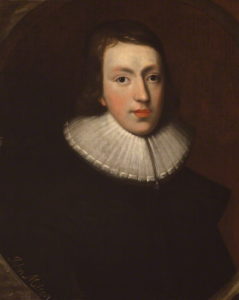
by Unknown artist, oil on canvas, feigned oval, circa 1629
Today is the anniversary of the death of poet John Milton, born in London (1608). His first two wives died from childbirth complications. His third wife, 31 years his junior, outlived him. In 1643, he published a pamphlet called Doctrine and Discipline of Divorce. He wrote: “Marriage is a cov’nant the very beeing wherof consists, not in a forc’t cohabitation, and counterfet performance of duties, but in unfained love and peace.” Milton wrote a poem, “Light” which served as inspiration for this poem. To Milton, unfained love and you.
Dreamin’ Light
This light, offspring of the sun,
Or of the eternal coeternal beam
May I say, you are my light,
Never endin’ approachable light
Dwelt from eternity, dwelt then in you,
Bright effluence of bright essence
Perhaps a rather pure ethereal stream,
Whose dream who shall tell? Before the sun,
Before me you were, and at your voice,
A sound I thought not to hear, I turned
The advancin’ shadows dark and deep,
Won from the void and formless infinity
You I revisit often with longing and hope,
Escaped the reality, though long detained
In that obscure sojourn, while in my flight
Through utter and through middle darkness
With these words that lead where they may,
I write of lost love and eternal night,
Taught by the Muse of Loss to venture down
The dark descent, and up to reascend,
Though hard and long: you I revisit safe,
And feel your voluptuous light; but you
Revisit not my eyes, that roll in vain
To find your piercin’ light, find no dawn;
Only the sight of you can quell this fear,
Or dim nightmares veiled. Yet not the more
Cease I to wander where the Muses haunt
Clear stream, or mountain slope, or forest hill,
Smit with the love of fervent words; beneath
The sun under the flowin’ waterfall
That pours and washes over tremblin’ flesh
Nightly I visit: this place we created
Where we lose ourselves in each other,
As time halts for us and the totem spins
I feed on these thoughts, that stir me
Harmonious words; as the poet wrote
Sonnets strident, verses verily, rhythmic rhymes
Pen this nocturnal note. Then with time
The world returns, but not to me returns
Day, or the sweet approach of dusk or dawn,
Or sight of you, or the curve of your hip,
Or your lips or eyes, or your face divine;
But clouds instead, and envelopin’ dark
Surrounds me, from the comfortin’ words
Cut off, and from the encroachin’ vastness,
Presentin’ itself with complete emptiness,
Tryin’ as I will as I might to raise myself,
But still at the entrance quite shut out
So much the dream and your lovely light
Shine on me, that alone can save me
To look into your eyes, all else falls away
Return and return again, that I may see
And tell of things invisible to mortal sight
The Song of the Day is “Dreaming Light” by Anathema
| Bram Stoker | |
|---|---|

Photograph of Bram Stoker circa 1906
|
|
Today is the birthday of Bram Stoker (Abraham Stoker; Clontarf, Dublin 8 November 1847 – 20 April 1912 London); author, perhaps best known today for his 1897 Gothic novel Dracula. During his lifetime, he was better known as the personal assistant of actor Henry Irving and business manager of the Lyceum Theatre in London, which Irving owned.
In 1878, Stoker married Florence Balcombe, daughter of Lieutenant-Colonel James Balcombe of 1 Marino Crescent. She was a celebrated beauty whose former suitor had been Oscar Wilde. Stoker had known Wilde from his student days, having proposed him for membership of the university’s Philosophical Society while he was president. Wilde was upset at Florence’s decision, but Stoker later resumed the acquaintanceship, and, after Wilde’s fall, visited him on the Continent.

The Stokers moved to London, where Stoker became acting manager and then business manager of Irving’s Lyceum Theatre, London, a post he held for 27 years. On 31 December 1879, Bram and Florence’s only child was born, a son whom they christened Irving Noel Thornley Stoker. The collaboration with Henry Irving was important for Stoker and through him he became involved in London’s high society, where he met James Abbott McNeill Whistler and Sir Arthur Conan Doyle (to whom he was distantly related). Working for Irving, the most famous actor of his time, and managing one of the most successful theatres in London made Stoker a notable if busy man. He was dedicated to Irving and his memoirs show he idolised him. In London, Stoker also met Hall Caine, who became one of his closest friends – he dedicated Dracula to him. Stoker’s inspirations for the story, in addition to Whitby, England, may have included a visit to Slains Castle in Aberdeenshire, a visit to the crypts of St. Michan’s Church in Dublin, and the novella Carmilla by Sheridan Le Fanu. Stoker was a deeply private man and not much is known about his personal life.
After suffering a number of strokes, Stoker died at No. 26 St George’s Square, London on 20 April 1912. Some biographers attribute the cause of death to overwork, others to tertiary syphilis. His death certificate named the cause of death as “Locomotor ataxia 6 months”, presumed to be a reference to syphilis. He was cremated, and his ashes were placed in a display urn at Golders Green Crematorium in north London. The ashes of Irving Noel Stoker, the author’s son, were added to his father’s urn following his death in 1961. The original plan had been to keep his parents’ ashes together, but after Florence Stoker’s death, her ashes were scattered at the Gardens of Rest.
Dracula is an epistolary novel, written as a collection of realistic but fictional diary entries, telegrams, letters, ship’s logs, and newspaper clippings, all of which added a level of detailed realism to the story, a skill which Stoker had developed as a newspaper writer. At the time of its publication, Dracula was considered a “straightforward horror novel” based on imaginary creations of supernatural life. It gave form to a universal fantasy and became a part of popular culture.
Prose
Dracula (1897)
- I heard a heavy step approaching behind the great door, and saw through the chinks the gleam of a coming light. Then there was the sound of rattling chains and the clanking of massive bolts drawn back. A key was turned with the loud grating noise of long disuse, and the great door swung back.
Within, stood a tall old man, clean shaven save for a long white moustache, and clad in black from head to foot, without a single speck of colour about him anywhere. He held in his hand an antique silver lamp, in which the flame burned without a chimney or globe of any kind, throwing long quivering shadows as it flickered in the draught of the open door. The old man motioned me in with his right hand with a courtly gesture, saying in excellent English, but with a strange intonation.
“Welcome to my house! Enter freely and of your own free will!”- Jonathan Harker’s journal
- I am Dracula, and I bid you welcome, Mr. Harker, to my house. Come in, the night air is chill, and you must need to eat and rest.
- Count Dracula to Jonathan Harker
- We are in Transylvania, and Transylvania is not England. Our ways are not your ways, and there shall be to you many strange things.
- Dracula to Jonathan Harker
- Listen to them — children of the night. What music they make.
- Dracula referring to the howling of the wolves to Jonathan Harker.
- No man knows till he has suffered from the night how sweet and dear to his heart and eye the morning can be.
- Jonathan Harker
- Despair has its own calms.
- Jonathan Harker
- Nothing is too small. I counsel you, put down in record even your doubts and surmises. Hereafter it may be of interest to you to see how true you guess. We learn from failure, not from success!
- Professor Abraham Van Helsing to Dr. John Seward
- He seemed so confident that I, remembering my own confidence two nights before and with the baneful result, felt awe and vague terror. It must have been my weakness that made me hesitate to tell it to my friend, but I felt it all the more, like unshed tears.
- Dr. John Seward
- Van Helsing and I came on here. The moment we were alone in the carriage he gave way to a regular fit of hysterics. He has denied to me since that it was hysterics, and insisted that it was only his sense of humour asserting itself under very terrible conditions. He laughed till he cried, and I had to draw down the blinds lest any one should see us and misjudge; and then he cried, till he laughed again; and laughed and cried together, just as a woman does. I tried to be stern with him, as one is to a woman under the circumstances; but it had no effect. Men and women are so different in manifestations of nervous strength or weakness! Then when his face grew grave and stern again I asked him why his mirth, and why at such a time. His reply was in a way characteristic of him, for it was logical and forceful and mysterious. He said:—
“Ah, you don’t comprehend, friend John. Do not think that I am not sad, though I laugh. See, I have cried even when the laugh did choke me. But no more think that I am all sorry when I cry, for the laugh he come just the same. Keep it always with you that laughter who knock at your door and say, ‘May I come in?’ is not the true laughter. No! he is a king, and he come when and how he like. He ask no person; he choose no time of suitability. He say, ‘I am here.’ Behold, in example I grieve my heart out for that so sweet young girl; I give my blood for her, though I am old and worn; I give my time, my skill, my sleep; I let my other sufferers want that so she may have all. And yet I can laugh at her very grave — laugh when the clay from the spade of the sexton drop upon her coffin and say ‘Thud, thud!’ to my heart, till it send back the blood from my cheek. My heart bleed for that poor boy — that dear boy, so of the age of mine own boy had I been so blessed that he live, and with his hair and eyes the same. There, you know now why I love him so. And yet when he say things that touch my husband-heart to the quick, and make my father-heart yearn to him as to no other man — not even you, friend John, for we are more level in experiences than father and son — yet even at such a moment King Laugh he come to me and shout and bellow in my ear, ‘Here I am! here I am!’ till the blood come dance back and bring some of the sunshine that he carry with him to my cheek. Oh, friend John, it is a strange world, a sad world, a world full of miseries, and woes, and troubles; and yet when King Laugh come, he make them all dance to the tune he play. Bleeding hearts, and dry bones of the churchyard, and tears that burn as they fall — all dance together to the music that he make with that smileless mouth of him. And believe me, friend John, that he is good to come, and kind. Ah, we men and women are like ropes drawn tight with strain that pull us different ways. Then tears come; and, like the rain on the ropes, they brace us up, until perhaps the strain become too great, and we break. But King Laugh he come like the sunshine, and he ease off the strain again; and we bear to go on with our labour, what it may be.”- Chapter XIV, Dr. Seward’s Diary entry for 22 September
- “Friend John, forgive me if I pain. I showed not my feeling to others when it would wound, but only to you, my old friend, whom I can trust. If you could have looked into my very heart then when I want to laugh; if you could have done so when the laugh arrived; if you could do so now, when King Laugh have pack up his crown, and all that is to him — for he go far, far away from me, and for a long, long time — maybe you would perhaps pity me the most of all.”
I was touched by the tenderness of his tone, and asked why.
“Because I know!”- Professor Van Helsing to Dr. John Seward, in Dr. Seward’s Diary entry for 22 September
- You reason well, and your wit is bold, but you are too prejudiced. You do not let your eyes see nor your ears hear, and that which is outside your daily life is not of account to you. Do you not think that there are things which you cannot understand, and yet which are, that some people see things that others cannot? But there are things old and new which must not be contemplated by men’s eyes, because they know, or think they know, some things which other men have told them. Ah, it is the fault of our science that it wants to explain all, and if it explain not, then it says there is nothing to explain. But yet we see around us every day the growth of new beliefs, which think themselves new, and which are yet but the old, which pretend to be young, like the fine ladies at the opera.
- Professor Van Helsing to Dr. Seward
- One and all we felt that the holy calm that lay like sunshine over the wasted face and form was only an earthly token and symbol of the calm that was to reign for ever.
- Dr. Seward of Lucy Westenra
- I have always thought that a wild animal never looks so well as when some obstacle of pronounced durability is between us. A personal experience has intensified rather than diminished that idea.
- The Keeper in the Zoological Gardens
- You think to baffle me, you with your pale faces all in a row, like sheep in a butcher’s. You shall be sorry yet, each one of you! You think you have left me without a place to rest, but I have more. My revenge is just begun! I spread it over centuries, and time is on my side. Your girls that you all love are mine already. And through them you and others shall yet be mine, my creatures, to do my bidding and to be my jackals when I want to feed. Bah!
- Dracula, having found Jonathan Harker, Quincey Morris and Arthur Holmwood in his house
- The sun was almost down on the mountain tops, and the shadows of the whole group fell upon the snow. I saw the Count lying within the box upon the earth, some of which the rude falling from the cart had scattered over him. He was deathly pale, just like a waxen image, and the red eyes glared with the horrible vindictive look which I knew so well. As I looked, the eyes saw the sinking sun, and the look of hate in them turned to triumph. But, on the instant, came the sweep and flash of Jonathan’s great knife. I shrieked as I saw it shear through the throat. Whilst at the same moment Mr. Morris’s bowie knife plunged into the heart. It was like a miracle, but before our very eyes, and almost in the drawing of a breath, the whole body crumbled into dust and passed from our sight. I shall be glad as long as I live that even in that moment of final dissolution, there was in the face a look of peace, such as I never could have imagined might have rested there.
- Mina Harker
- Seven years ago we all went through the flames. And the happiness of some of us since then is, we think, well worth the pain we endured.
- Jonathan Harker
| Charles Demuth | |
|---|---|

Self-Portrait, 1907
|
|
Today is the birthday of Charles Henry Buckius Demuth (Lancaster, Pennsylvania; November 8, 1883 – October 23, 1935 Lancaster); watercolorist who turned to oils late in his career, developing a style of painting known as Precisionism.
Gallery
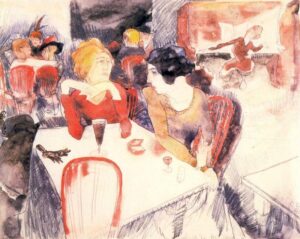
“Nana, Seated Left, and Satin at Laure’s Restaurant”
(1916)
Museum of Modern Art

-

The Jazz Singer (1916)
-

Trees and Barns Bermuda (1917)
-

Turkish Bath with Self Portrait (1918)
-

The Boat Ride from Sorrento (1919)
-
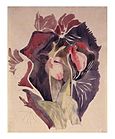
Wild Orchids (1920)
-

Spring (1921)
-

Incense of a New Church (1921)
-
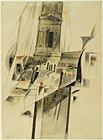
Roofs and Steeple (1921)
-
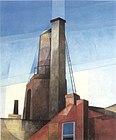
Aucassin and Nicolette (1921)
-

Study for Poster Portrait, Marsden Hartley (1921) (c. 1923–1924)
-

Sail: In Two Movements, 1919
-

Charles Demuth – Love Love Love, 1928, Museo Thyssen-Bornemisza, Madrid
| Margaret Mitchell | |
|---|---|
 |
|
And today is the birthday of Margaret Munnerlyn Mitchell (Atlanta, Georgia; November 8, 1900 – August 16, 1949 Atlanta); author and journalist. One novel by Mitchell was published during her lifetime; the epic American Civil War-era novel, Gone with the Wind, for which she won the National Book Award for Most Distinguished Novel of 1936 and the Pulitzer Prize for Fiction in 1937. In more recent years, a collection of Mitchell’s girlhood writings and a novella she wrote as a teenager, Lost Laysen, have been published.
Margaret began using the name “Peggy” at Washington Seminary, and the abbreviated form “Peg” at Smith College when she found an icon for herself in the mythological winged horse, “Pegasus”, that inspires poets.
Although her family disapproved, Peggy and Berrien (“Red”) Kinnard Upshaw married on September 2, 1922; the best man at their wedding was John Marsh, who would become her second husband. The couple resided at the Mitchell home with her father. By December the marriage to Upshaw had dissolved and he left. Mitchell suffered physical and emotional abuse, the result of Upshaw’s alcoholism and violent temper. Upshaw agreed to an uncontested divorce after John Marsh gave him a loan and Mitchell agreed not to press assault charges against him. Upshaw and Mitchell were divorced on October 16, 1924.
On July 4, 1925, 24-year-old Margaret Mitchell and 29-year-old John Marsh were married in the Unitarian-Universalist Church.[18]: 125 The Marshes made their home at the Crescent Apartments in Atlanta, taking occupancy of Apt. 1, which they affectionately named “The Dump” (now the Margaret Mitchell House and Museum). While still legally married to Upshaw and needing income for herself, Mitchell got a job writing feature articles for The Atlanta Journal Sunday Magazine. She received almost no encouragement from her family or “society” to pursue a career in journalism, and had no prior newspaper experience. During the time Mitchell worked for the Atlanta Journal, she wrote 129 feature articles, 85 news stories, and several book reviews.
In May 1926, after Mitchell had left her job at the Atlanta Journal and was recovering at home from her ankle injury, she wrote a society column for the Sunday Magazine, “Elizabeth Bennet’s Gossip”, which she continued to write until August. Meanwhile, her husband was growing weary of lugging armloads of books home from the library to keep his wife’s mind occupied while she hobbled around the house; he emphatically suggested that she write her own book instead:
For God’s sake, Peggy, can’t you write a book instead of reading thousands of them?
To aid her in her literary endeavors, John Marsh brought home a Remington Portable No. 3 typewriter (c. 1928). For the next three years Mitchell worked exclusively on writing a Civil War-era novel whose heroine was named Pansy O’Hara (prior to Gone with the Wind‘s publication Pansy was changed to Scarlett). She used parts of the manuscript to prop up a wobbly couch.
Gone with the Wind was popular with American readers from the outset and was the top American fiction bestseller in 1936 and 1937. As of 2014, a Harris poll found it to be the second favorite book of American readers, just behind the Bible. More than 30 million copies have been printed worldwide.
Gone with the Wind is a controversial reference point for subsequent writers of the South, both black and white. Scholars at American universities refer to, interpret, and study it in their writings. The novel has been absorbed into American popular culture.
Mitchell received the Pulitzer Prize for Fiction for the book in 1937. It was adapted into the 1939 film of the same name, which has been considered to be one of the greatest movies ever made and also received the Academy Award for Best Picture during the 12th annual Academy Awards ceremony. Gone with the Wind is the only novel by Mitchell published during her lifetime.
Margaret Mitchell was struck by a speeding automobile as she crossed Peachtree Street at 13th Street in Atlanta with her husband, John Marsh, while on her way to see the movie A Canterbury Tale on the evening of August 11, 1949. She died at age 48 at Grady Hospital five days later on August 16 without fully regaining consciousness.
The driver, Hugh Gravitt, was an off-duty taxi driver who was driving his personal vehicle when he struck Mitchell. After the collision, Gravitt was arrested for drunken driving and released on a $5,450 bond until Mitchell’s death.
Gravitt was originally charged with drunken driving, speeding, and driving on the wrong side of the road. He was convicted of involuntary manslaughter in November 1949 and sentenced to 18 months in jail. He served almost 11 months. Gravitt died in 1994 at the age of 73.
Margaret Mitchell was buried at Oakland Cemetery, Georgia. When her husband John died in 1952, he was buried next to his wife.
Prose from Gone with the Wind
- “The trouble with most of us Southerners,” continued Rhett Butler, “is that we either don’t travel enough or we don’t profit enough by our travels…. I have seen many things that you all have not seen. The thousands of immigrants who’d be glad to fight for the Yankees for food and a few dollars, the factories, the foundries, the shipyards, the iron and coal mines &mdash all the things we haven’t got. Why, all we have is cotton and slaves and arrogance. They’d lick us in a month.”
- Chapter 6
- Before the war there had been few cotton factories, woolen mills, arsenals and machine shops south of Maryland, a fact of which all Southerners were proud. The South produced statesmen and soldiers, planters and doctors, lawyers and poets, but certainly not engineers or mechanics. Let the Yankees adopt such low callings.
- Chapter 8
- “In the end what will happen will be what has happened whenever a civilization breaks up. The people who have brains and courage come through and the ones who haven’t are winnowed out. At least, it has been interesting, if not comfortable, to witness a Gotterdammerung.”
- “A what?”
- “A dusk of the gods. Unfortunately, we Southerners did think we were gods.”
- Chapter 31
- “It isn’t that I mind splitting logs here in the mud, but I do mind what it stands for. I do mind, very much, the loss of the beauty of the old life I loved. Scarlett, before the war, life was beautiful. There was a glamor to it, a perfection and a completeness and a symmetry to it like Grecian art. Maybe it wasn’t so to everyone. I know that now. But to me, living at Twelve Oaks, there was a real beauty to living. I belonged in that life. I was a part of it. And now it is gone and I am out of place in this new life, and I am afraid. Now, I know that in the old days it was a shadow show I watched. I avoided everything which was not shadowy, people and situations which were too real, too vital. I resented their intrusion. I tried to avoid you too, Scarlett. You were too full of living and too real and I was cowardly enough to prefer shadows and dreams.”
- Chapter 31
- I cannot understand why I did not desert. It was all the purest insanity. But it’s in one’s blood. Southerners can never resist a losing cause.
- Chapter 34
- There ain’t nothin’ that walks can lick us, any more than it could lick him, not Yankees nor Carpetbaggers nor hard times nor high taxes nor even downright starvation. But that weakness that’s in our hearts can lick us in the time it takes to bat your eye.
- Chapter 38
- Hardships make or break people.
- Chapter 40
- These women, so swift to kindness, so tender to the sorrowing, so untiring in times of stress, could be as implacable as furies to any renegade who broke one small law of their unwritten code. This code was simple. Reverence for the Confederacy, honor to the veterans, loyalty to old forms, pride in poverty, open hands to friends and undying hatred to Yankees.
- Chapter 47
- Drink and dissipation had done their work on the coin-clean profile and now it was no longer the head of a young pagan prince on new-minted gold but a decadent, tired Caesar on copper debased by long usage.
- Chapter 63
- She was seeing through Rhett’s eyes the passing, not of a woman but of a legend — the gentle, self-effacing but steel-spined women on whom the South had builded its house in war and to whose proud and loving arms it had returned in defeat.
- Chapter 63
Mac Tag
Yet is not ecstasy some fulfillment of the soul in itself, some slow or sudden expansion of it like an overflowing well? – WB Yeats
Follow us on twitter @cowboycoleridge

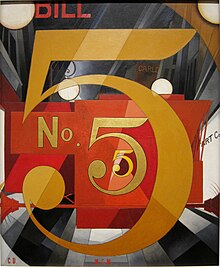
No Comments on "The Lovers’ Chronicle 8 November – death of Milton – birth of Bram Stoker & Margaret Mitchell – art by Charles Demuth"